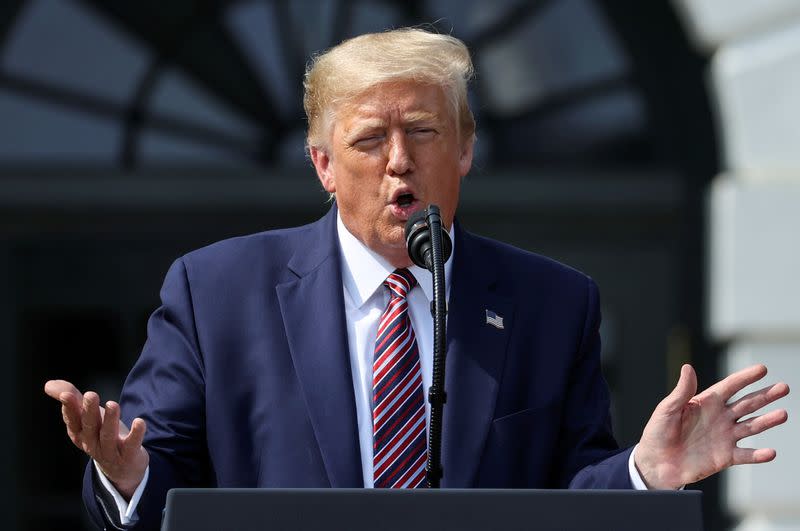U.S. Senate Republicans, White House cite early progress on coronavirus aid bill
By David Lawder and Richard Cowan
WASHINGTON (Reuters) - Leading U.S. Senate Republicans and the White House late on Wednesday said they had hammered out agreements in principle on portions of a potential coronavirus-response bill, which could be presented to Democrats as early as this week as lawmakers raced to pass legislation by the end of July.
Treasury Secretary Steven Mnuchin told reporters, "There is an agreement" on sending another round of direct payment checks to Americans to help them get through economic woes created by the worsening coronavirus pandemic.
Mnuchin, however, would not provide details on the amount of money individuals and families might receive or qualifications for getting the checks under this Republican-crafted plan.
Senate Appropriations Committee Chairman Richard Shelby said a "fundamental agreement" had also been reached on a possible package of measures to pay for additional relief.
Senate Majority Leader Mitch McConnell had been talking about a bill that would spend no more than $1 trillion, far below the $3 trillion that House of Representatives Democrats approved in May.
With deaths growing from COVID-19, the disease caused by the novel coronavirus, Senator Roy Blunt, an Appropriations Committee member, said $25 billion will be proposed to beef up testing for the highly contagious virus.
The signs of progress came at the end of a day in which Republicans voiced varying stances on major components of what would be a fifth major aid package this year in response to the pandemic.
Earlier on Wednesday, Republican Senator Kevin Cramer said it was "possible" that Congress would fail to reach a deal before leaving for an August recess.
With federally funded enhanced unemployment benefits set to expire on July 31, there were internal Republican battles over an extension of the current $600 per week payments. Many Republicans have complained that amount is too high and was discouraging some workers from returning to jobs.
Several Republican senators said they were discussing temporarily extending unemployment benefits as a possible stopgap measure if a broad package could not be passed in the next 10 days, though a key adviser to President Donald Trump voiced objections to that idea on Wednesday.
Agreement within the Republican caucus would be just a first step before launching intensive negotiations with House and Senate Democratic leaders.
"I think we should do the whole thing, but if we can't get it done by next week, we cannot allow there to be a cliff in unemployment insurance," Senator Rob Portman, an Ohio Republican, told reporters. "We're still at 11% unemployment, about 17 million Americans out of work through no fault of their own."
With some Republicans wanting to reduce the weekly jobless payments to $400 per week, House Speaker Nancy Pelosi said in an interview with CNBC: "We should not be quibbling over $400 or $600 when people are in desperate need and have great uncertainty."
While both parties agree on some concepts, such as more aid for small businesses and funds for coronavirus testing, they differ on Trump's desire for a general payroll tax cut and over whether to shield businesses from lawsuits if workers or customers get infected with the coronavirus.
Chad Stone, chief economist at the Center for Budget and Policy Priorities, a left-leaning Washington think tank, said the extra cash generated by enhanced unemployment benefits has helped prop up consumer spending in the face of the steepest economic downturn since the 1930s Great Depression.
"If that money goes away or gets reduced substantially, it will be a hit to the economy," Stone said.
Senator David Perdue, a Georgia Republican, expressed opposition to an extension. "What I'd prefer is if you want to give a few bucks to people, put it into a direct payment." he said.
Some Republican senators, like Mitt Romney of Utah, oppose direct payments. Senator Ted Cruz of Texas told CNN that he is a "hell no" on the Republican proposal in its current form, saying that it would spend too much, causing a "feeding frenzy" among Washington lobbyists.
(Reporting by David Lawder and Richard Cowan; additional reporting by Jan Wolfe and Susan Cornwell; Editing by Scott Malone, Aurora Ellis, Jonathan Oatis and Cynthia Osterman)


